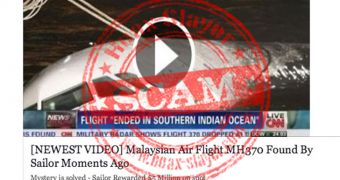After the disappearance of the Malaysia Airlines flight 370 made the headlines of reputable news sources for quite a while because the plane could not be located, it would be odd to receive the news of it being found on Facebook.
And yet, unsuspecting users may fall into the trap of survey scammers, who launched a new campaign these days, purporting a video of a sailor that found the device.
Of course, the scam relies on the gullibility of the potential victim, and the “video,” which is nothing but an image falsely presented as a framed footage, does not exist.
The purpose of the scam is to trick users into completing surveys, which puts money in the pockets of the crooks.
Hoax-Slayer says that the image circulating on Facebook is actually of a US Airways plane that crashed into the Hudson river back in 2009.
To incite clicking on the links provided with the “video,” the scammers also added the message that the sailor who found the airliner was awarded $5 million / €3,7 million on the spot.
This is so incredible news that many should notice from the get-go the scam potential behind it.
Of course, watching the footage first requires sharing the news to your friends, to trap more victims in, then you are taken outside Facebook and presented with a survey that needs to be completed.
“The scammers who create these fake video posts earn money via dodgy affiliate marketing schemes each and every time that a user participates in a survey. And, by tricking people into sharing the scam posts, they can greatly increase the number of potential victims,” says the Hoax-Slayer post.
This type of scams can often ask the victim to share personal information such as phone number or email address, which can be used by the crooks in spam campaigns or for subscriptions to premium-rate messages.
Multiple surveys can be pushed to the same victim and the video will never be presented, because it does not exist.
However, in some cases the risk is greater, as there are malicious campaigns that ask users to download various bits of software, which turn out to be malicious.
Recently, Facebook helped disrupt a botnet of more than 250,000 computers that were infected with a crypto-currency mining tool. As a result of one malicious campaign on Facebook, the cybercriminals managed to compromise as many as 50,000 user accounts.

 14 DAY TRIAL //
14 DAY TRIAL //